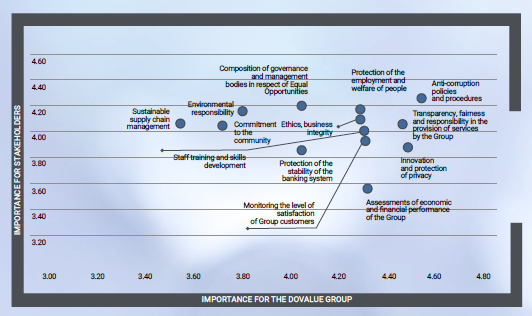Economic, social and governance sustainability has always characterised the doValue Group’s international growth, actively committed to developing a culture shared with all stakeholders.
doValue regards the constant relationship with all its stakeholders as fundamental and in line with last year, the categories of Stakeholders with which the company interfaces in the performance of its activities are the following:
- Shareholders
- Market
- Banks
- Investors
- Employees
- Customers
- Community and debtors
- External Network
- Suppliers
The Group maintains continuous and constructive dialogue with its stakeholders, the main asset for the conduct of its daily activities, on the basis of the principles of transparency, independence and integrity.
The Materiality Matrix is a tool that identifies the most relevant environmental, social and governance priorities for the Group and its stakeholders, in line with its business strategy, i.e., those aspects which significantly affect the ability to create value in the short, medium and long term.
Starting from the relevant issues that emerged last year, doValue updated its materiality analysis in view of the evolution of the reference scenario and the strategic priorities presented in the Sustainability Plan.
In 2021, the thirteen topics defined as material (divided up with reference to the spheres envisaged by Italian Legislative Decree no. 254/2016), identified in 2019 through an industry benchmark and assessed through a survey of employees and a group of suppliers, were confirmed.
The 13 material topics were shared with Top Management, the Risk, Related Parties and Sustainability Committee and the Board of Directors.
The material topics, inherent to the various dimensions of sustainability, were divided up with reference to the spheres envisaged by Italian Legislative Decree 254/2016 and are listed below.
| Material topics | Reference spheres pursuant to Italian Legislative Decree no. 254/2016 |
| Innovation and protection of privacy | - Social - Staff - Environment |
| Transparency, fairness and responsibility in the provision of services chosen by the Group | - Social - Fight against bribery and corruption |
| Staff training and skills development | - Staff |
| Anti-corruption policies and procedures | - Fight against bribery and corruption |
| Monitoring the level of customer satisfaction of the Group | - Social |
| Protection of the stability of the banking system | - Social |
| Composition of governing bodies and personnel management in respect of equal opportunities | - Staff |
| Ethics, business integrity | - Social |
| Protection of the employment and welfare of people | - Staff - Respect for human rights |
| Assessments of economic and financial performance of the Group | - Social |
| Environmental responsibility | - Environment |
| Sustainable management of the supply chain | - Environment - Social |
| Commitment to the community | - Social |
The graphical representation of the materiality matrix provides an overview of the issues found to be most relevant from the updating process of the analyses conducted in 2021.

The topics that are more relevant than last year are environmental responsibility and sustainable supply chain management.
Of lesser magnitude is the increase in the relevance of the topic community engagement. Transparency, fairness and responsibility in the provision of services provided by the Group decreases in importance, as do the following topics: assessment of the Group’s economic performance and financial soundness and protection of the stability of the credit system.
In absolute terms, the relevance of topics related to the Group’s People remains high, as do those linked to transparency and anti-corruption, but there has also been an increase in the relevance of topics related to sustainability more linked to Environmental values.



